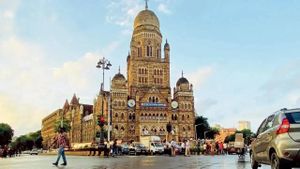Ontario is gearing up for its snap election as party leaders campaign vigorously against the backdrop of looming US tariffs. Following Canada receiving its 30-day reprieve from the anticipated 25 percent tariffs on Canadian goods, Progressive Conservative Leader Doug Ford and New Democratic Party (NDP) Leader Marit Stiles are scheduled to make stops in Ottawa as early as this morning.
Ford, who previously called for the election on February 27, is defending his decision to campaign amid the tariff crisis. He asserts he can manage both roles, maintaining his obligations as premier and his election campaign simultaneously. His comments come at a time when critics argue this is not the right moment for Ontario to encounter such political upheaval.
The chaotic beginning of the week saw Ford, along with Stiles and Liberal Leader Bonnie Crombie, lay out plans to tackle the challenges posed by the tariff threats. Stiles, after her announcement this morning, will head to Kingston, Ont., where she aims to draw attention to her platform. Crombie plans to address tax cuts in Brampton and capitalize on her party's stance against the tariffs.
Earlier this week, Ford announced several retaliatory measures as premier, including the removal of American products from the Liquor Control Board of Ontario shelves. This move coincided with announcements to reverse contracts with American companies, including canceling a $100 million deal with Elon Musk's SpaceX, meant to provide high-speed internet via Starlink technology.
On Monday, these measures were put on hold following news from US President Donald Trump agreeing to postpone the tariff implementation for at least 30 days. Prime Minister Justin Trudeau confirmed the reprieve, stating the economic concerns presented by the tariffs were complicated by the political climate.
Next week, Ford's party is preparing to launch major stimulus spending proposals worth tens of billions, which would be contingent on the government being re-elected. “If any emergencies come, I’ll reconvene cabinet. That’s not an unusual request,” Ford replied emphatically when asked about the viability of managing both campaigning and addressing the tariffs.
This election, labeled as costing $189 million, has been questioned by other party leaders. Crombie accused Ford of clinging to power unnecessarily, particularly under the shadow of economic threats from the US. “When you know there’s a threat coming, why would you choose this moment to call for elections?” she challenged.
Scrutinizing Ford’s motives, Green Party Leader Mike Schreiner highlighted the need for unity rather than playing divisive politics. “The premier should be focusing on consensus to battle the tariffs instead of facing off against us,” he criticized.
NDP’s Stiles did express relief at the recent tariff reprieve. Nonetheless, she insisted on the necessity for political cooperation during this precarious time. She stated, “We need to defend every single job and be ready to fight back.” Her party also indicated their intentions to develop tariffs protections if they assume power.
Specific measures proposed from the other leaders include Crombie’s “Fight Tariffs Fund,” which aims to alleviate financial pressures on Ontario businesses through lower interest rates and other financial incentives, and urging return of Canadian healthcare workers from the United States with bonuses. Stiles outlines plans for direct agency procurement locally and forming supply chains for industries vulnerable to tariffs.
Both Crombie and Stiles harbor skepticism toward Ford's abilities as premier. Ford's supporters argue he is just doing what is necessary to gather the requisite backing to face off against US pressures. On the contrary, Stiles reflected on past failures, particularly Ford's response when General Motors ceased production of vehicle manufacturing sites, hinting at lost trust and potential mismanagement of current circumstances.
Green leader Schreiner also focused attention on housing policies during his campaign stops, advocating for revising development charges and removing barriers for first-time homebuyers. His broader vision includes advocating for three to six-unit homes on main streets to redefine urban spaces.
The Ontario election will not only serve as a political battleground for party leaders but also test public sentiment against the backdrop of shifting economic policies and external pressures from US tariffs. Each leader presents different visions, reflecting their strategies for both campaign rhetoric and future governance.
The snap election is poised to reshape Ontario's political future at a time when trade relationships with the US become increasingly precarious. The conversation about tariffs, economic resilience, and political accountability will dominate as Ontarians prepare to head to the polls.



